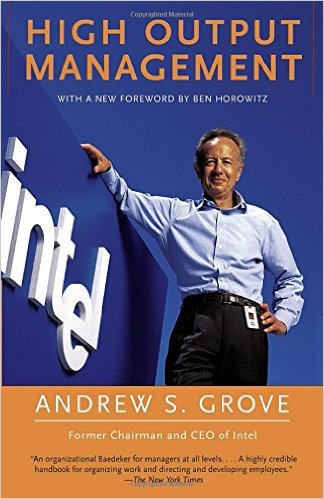High Output Management by Andy Grove
The Big Idea: Understand the principles of factory production and apply them to business management.
Chapter 1: The Basics of Production
- Focus efforts on identifying and fixing the bottleneck (limiting step) in the workflow
Chapter 2: Managing The Breakfast Factory
- Define good KPI’s.
- Understand JIT inventory management.
- Automate things to improve work leverage.
Chapter 3: Managerial Leverage
- Judge a manager by the results of his team.
- Results are what matter; not effort.
- Most of a manager’s time is spent acquiring information, which is critical to making good decisions.
- The most important resource for a manager is his time.
- Being prepared for meetings saves a lot of other people’s time.
- Investing time preventing someone important from quitting saves lots of time finding a replacement.
- New employee orientations are important to do well since new employees are most impressionable.
- Meddling too much can hurt performance in the long-run.
- Delegation is another way to improve leverage.
- When you delegate, you must still monitor and follow up.
- When reviewing reports, ask to see the rough draft to add feedback as early as possible.
- Batch similar tasks together to save time.
- Use your calendar to manage your work and minimize interruptions.
- Have some free-time projects to tackle during downtime.
- Six to eight subordinates is about right.
- Minimize interruptions and documenting FAQs, delegating, batching, and having fast access to information (KPI).
Chapter 4: Meetings
- Meetings have a bad name, but they add lots of value if done well.
- Regular meetings allow managers to batch decisions and batch information sharing.
- One-on-ones are great for teaching, sharing information, and building relationship.
- One-on-ones can start out weekly and move to monthly.
- One-on-ones should be about an hour.
- Staff meetings are to discuss issues and offer solutions.
- Staff meetings should have an agenda and an open discussion session.
- Mission oriented meetings are ad-hoc and designed to produce a key decision.
Chapter 5: Decisions
- Be wary of groupthink in group decisions.
- Be wary of peer-plus-one in group decisions, where everyone automatically agrees with the senior manager’s opinion.
Chapter 6: Planning
- Understand basic factory production principles.
- Apply Management By Objectives (Key Objective, Key Results) and review every quarter or every month.
Chapter 7: The Breakfast Factory Goes National (Scaling)
- The central tradeoffs when scaling is centralization/decentralization. (Buddhism/Catholicism in Scaling Up Excellence.)
Chapter 8: Hybrid Organizations
- Mission-oriented companies are completely decentralized. Units work towards the mission but operate independently.
- Functional companies are completely centralized.
- Most companies are a hybrid of mission-oriented and functional.
Chapter 9: Dual Reporting
- Matrix management means employees can have two supervisors (their business unit supervisor and their functional unit supervisor.)
- For example: a controller can report to the CFO and also to the business unit general manager.
Chapter 10: Modes of Control
- Sometimes you will motivate by money, sometimes by contract, and sometimes by shared cultural values.
Chapter 11: The Sports Analogy
- Management is a team activity.
- Employee performance is a function of training and motivation.
- Understand where on Maslow’s Hierarchy the employee is at.
- Most people are competitive and motivation is a given in competitive sports, so try and turn work into a game by providing instant feedback and metrics.
Chapter 12: Task-Relevant Maturity
- Provide detailed instructions to an inexperienced employee.
- Establish monitoring and then give experienced employees freedom and autonomy.
Chapter 13: Performance Appraisals
- Performance reviews are absolutely necessary.
- Level, listen, and leave yourself out.
- Document everything.
- Give the review in writing, first, and then meet later in person to review.
Chapter 14: Two Difficult Tasks
- Interviewing is just about impossible.
- Do everything you can to save a valued employee who wants to quit.
Chapter 15: Compensation as Task-Relevant Feedback
- Some employees view salary as a means to pay for living expenses. Some employees view salary as a measuring stick to compare to others.
- Performance bonuses should be partly individual, partly team, and partly organization.
- Performance bonuses should be linked to objective metrics.
Chapter 16: Why Training Is the Boss’s Job
- Don’t hire external trainers to train employees if you can do it yourself.
- Managers should learn how to teach a formal course to employees.
